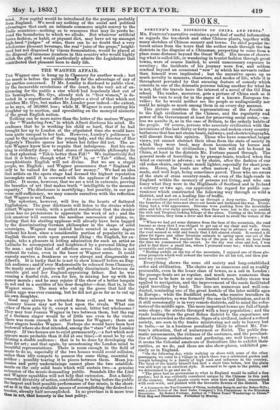THE WAGNER AFFAIR.
THE Wagner case is hung up in Ckancery for another week ; but too much is before the public already for the advantage of any of the parties concerned. If Mr. Lumley is disclosed to public view, by the inexorable revelations of the court, in the very act of an- nouncing for the public a star which- had hopelessly shot out of his hemisphere, Mr. Gye, already rich in "first women," is de- tected in a superfluous effort to deprive a rival of that which not enriches Mr. Gye, but makes Mr. Lumley poor indeed—the extent, as he says, of 30,0001. loss ; while M. Wagner is seen putting his daughter up to auction, and speculating on the moneyed niaiserie of the great English nation.
Nothing can be more naïve than the letter of the mature Wagner to the "Wandering Jew," in which Albert discloses his mind. He confesses that he is working his child so hard, that if he had brought her up to London at the stipulated time she would have been quite unequal to her task. However, Lumley's politeness is equal to the exigencies of the young lady, and the director of Her Majesty's Theatre spares her where her father did not. The as- tute Wagner knew how to requite that indulgence. But his cun- ning is evidently deep : what stores of inscrutable philosophy lie in that aphorism "Tab is better than Fid ! " We instinctively feel that it is better; though what " Fid" is, or " Tab " either, the unsophisticate English will not divine. But we are a stupid people, we English ; and Wagner pronounces that "England is only to be valued for the sake of her money." We had an idea that artists on the opera stage had deemed the highest reputation incomplete until it is crowned with the applause of the London public. It seems, however, that we are a test in extremis, proving the beauties of art that makes truth "intelligible to the meanest capacity." The disclosure is mortifying; but possibly, in our per- verse self-sufficiency, we may console ourselves with the reflection that Wagner is not Faust.
The aphorism, however, will live in the hearts of flattered Englishmen. The poor dilettante will listen to the strains which Albert Wagner vends, with a perfect recollection that the slender purse has no pretensions to appreciate the work of art ; and the rich amateur will surcease the needless concussion of palms, re- flecting that hie sterling applause will already have been bagged by the discriminating German philosopher in the shape of solid sovereigns. Wagner may indeed have counted in some degree without his host, since a considerable portion of popularity in an English theatre rests upon personal liking : the English, for ex- ample, take a pleasure in letting admiration for such an artist as Lablache be accompanied and heightened by a personal liking for the man : and this kind of affection across the orchestra is not without its value, even in the baser or Wagner sense. It could scarcely survive a frankness so very abrupt and disagreeable as Albert's. It is lucky that he is not to show himself before an Eng- lish audience ; and if ever Mademoiselle be released from Chancery, the manly sense of justice will probably discriminate between an amiable girl and her England-appraising father. But he was running a fearful risk, even for her, in mixing her up with his money morals ; and he may rejoice if the show of a better bargain do not end in a sacrifice of his dear daughter—dear, that is, in the Wagner sense. The man who cut up the goose that laid the golden eggs was over cunning, but he did not go so far as to cut up his own daughter. Good may always be extracted from evil, and we trust the Chancery lesson may not be lost upon the rivals. What can either of them gain by it, except 'a moral, bitter but wholesome P They may tear Joanna Wagner in two between them, but the rag of a German singer would be of little use even to the victor. There was room enough in either house for Wagner ; there are other singers besides Wagner. Perhaps she would have been best bestowed where she first intended, among the" stars" of the Lumley galaxy. If two houses are to exist permanently,— a fact which now appears more probable than it did at one time,—it must be by cul- tivating a double audience : that is to be done by developing the taste for art ; and that again, by accustoming the London mind to beautiful representations. There is room enough in the field of music to do so, especially if the two houses would avoid collision, rather than idly compete to possess the same thing, essential to neither ; possibly tearing it to pieces between them. Mean jea- lousies and petty underminings cannot place the two establish- ments on the only solid basis which will sustain two—a genuine extension of the music-demanding public. Scandals like the Lind and Wagner squabbles will not help that extension. But a fairly- concerted diversity of action, contributing to bring before the public the largest and best possible performance of fine music, is the short- est as. it is the only available means of accomplishing the desired ex- tension, already half accomplished. In no province is it more true than in art, that honesty is the best policy.


























 Previous page
Previous page